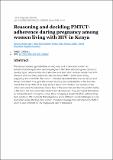| dc.description.abstract | This study explores type identities among rural and urban slum women on antiretroviral therapies who become pregnant. Narrative structuring was chosen to develop type narratives that illustrate how rural and urban women handle their HIV-infection and how they reason and decide about PMTCT-adherence during pregnancy and childbirth. Women in rural areas described their lives as 'secure and family controlled'. This gave the women security and predictability in life, but also meant that it was difficult to keep secrets about HIV infection. For women in the urban slum area the narratives were a tale of the uncertain and hard to predict reality in the slum, but also about self-reliance and decisiveness. They portrayed themselves as 'vulnerable and striving to survive' thus managing a tough situation without long-term solutions.
This study explores typical profiles of women living in rural areas and urban slums, who become pregnant while on antiretroviral therapy (ART). The narrative structure was chosen to develop two types of narratives illustrating how women living in rural and urban areas cope with their HIV status, and how they reason and make decisions about adherence to prevention of mother transmission. - HIV child (PMTCT), during pregnancy and childbirth. Women in rural areas have portrayed their lives as “safe and controlled by the family”. This situation guaranteed them a certain security and the means to project themselves in life, but also meant that it was difficult for them to maintain confidentiality on HIV-related matters. As far as women living in slums are concerned, the tales are tales of uncertainty and difficulty in being able to predict the reality of their environment, but also their autonomy and determination. These women described themselves as "vulnerable and struggling to survive", hence having to deal with a difficult situation without long-term solutions. We conclude that pregnancy presents different social challenges in rural and urban areas, which have an impact on the choices of women in their management of adherence to PMTCT, itself influenced by the stigma of HIV and non-disclosure. seropositivity. As far as women living in slums are concerned, the tales are tales of uncertainty and difficulty in being able to predict the reality of their environment, but also their autonomy and determination. These women described themselves as "vulnerable and struggling to survive", hence having to deal with a difficult situation without long-term solutions. We conclude that pregnancy presents different social challenges in rural and urban areas, which have an impact on the choices of women in their management of adherence to PMTCT, itself influenced by the stigma of HIV and non-disclosure. seropositivity. As far as women living in slums are concerned, the tales are tales of uncertainty and difficulty in being able to predict the reality of their environment, but also their autonomy and determination. These women described themselves as "vulnerable and struggling to survive", hence having to deal with a difficult situation without long-term solutions. We conclude that pregnancy presents different social challenges in rural and urban areas, which have an impact on the choices of women in their management of adherence to PMTCT, itself influenced by the stigma of HIV and non-disclosure. seropositivity. but also their autonomy and determination. These women described themselves as "vulnerable and struggling to survive", hence having to deal with a difficult situation without long-term solutions. We conclude that pregnancy presents different social challenges in rural and urban areas, which have an impact on the choices of women in their management of adherence to PMTCT, itself influenced by the stigma of HIV and non-disclosure. seropositivity. but also their autonomy and determination. These women described themselves as "vulnerable and struggling to survive", hence having to deal with a difficult situation without long-term solutions. We conclude that pregnancy presents different social challenges in rural and urban areas, which have an impact on the choices of women in their management of adherence to PMTCT, itself influenced by the stigma of HIV and non-disclosure. seropositivity. | en_US |

